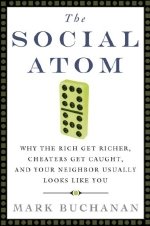A few weeks ago, Dr James B. Burnham of the Donahue Graduate School of Business at Duquesne University sent me a polite email chiding me for my discussion, in The Social Atom, of the work of economist Gary Becker. Becker is famous for his association with the so-called Rational Choice school of economic thinking, which tries to model a great deal of human behaviour -- including things like crime, individuals' choices to have children and so on -- in terms of people making fully rational choices. Becker's Nobel Prize Lecture from 1992 offers a nice synopsis of the principle ideas and some of their applications.
I portrayed Becker as being rather strongly committed to the rationalistic viewpoint, and Burnham quite rightly points out that I overlooked a classic work of Becker's, Irrational Behavior and Economic Theory, published in the Journal of Political Economy, February 1962. In the paper, it seems, Becker tried to establish some of the central "theorems" of classical economics without insisting on full individual rationality. Dr. Burnham was also kind enough to send me a copy of the paper, and I'm in the process of reading it. Hopefully I'll be able to comment tomorrow on just how fairly or unfairly I treated him.
But I came across something today, not quite as old as the overlooked Becker paper, that I suspect may shed some light on the question of whether people are rational or not, and when economic rationality can be assumed without fear of getting things rather completely wrong. The paper in question is a short review from last year by economists Ernst Fehr and Colin Camerer, looking at the question of how the collective logic of a situation can strongly influence human behaviour -- sometimes even making rational people act "irrationally," with important consequences.
Contrast the following two situations:
1. Suppose you'd like to try to win some money by playing the University of Iowa Presidential Election Market for the 2008 election. The idea is that you can buy a contract that will pay off if, when the election takes place, the numbers turn out a certain way. The contract you buy should reflect what you think is really going to happen, and accuracy will make it pay out more. Suppose you're an extremely well informed political analyst, more knowledgeable and with access to more information than just about anyone. Then you should act rationally, making your best guess. If everyone else playing the market goes half mad and starts buying futures for some completely implausible candidate, so be it; you'd have no incentive to follow. The more crazies out there, the more your cool wisdom will pay off.
2. Suppose instead that you decide to play the stock market. Again, being a bright and well informed individual, you scour the financial pages and identify one stock that you're sure is undervalued. Maybe it's IBM. You know they're in healthy condition, with diversified interests and good leadership, even though many irrational investors, lured by sexier stocks in smaller companies, have ignored IBM and pushed its value down unreasonably. So what do you do? Apparently, it seems, you could follow a similar strategy to the example above. Trust your own superior knowledge, buy up lots of IBM stock, and then sit back and wait for the price to return to it proper, reasonable value. Then you can sell it for a killing, making easy money.
The problem, as Fehr and Camerer point out, is that these two situations, though superficially similar, are actually totally different.
In the first case, other people being irrational gives you no incentive to follow along. The collective logic -- and the fact the election will take place on a specific date, at which point all contracts will be settled -- means that rational strategies work best. But in the second case, there's no guarantee. You may in all sound wisdom buy up the undervalued IBM stock, and then find over coming weeks and months that the irrational mob only acts to devalue it more. The herd may push its price down to ridiculous levels and leave it there for years; keeping your money in the dumps while it could have been earning interest elsewhere. In the latter situation, the rational can easily be forced to follow along with the irrational herd.
Fehr and Camerer argue that these examples illustrate a general pattern:
Individuals who violate the assumptions of economics may create powerful economic incentives for Economic Man to change his behavior...
This is indeed one of the major shortomings of any theory that assumes rational behavior; rational action, in a sense, is often just not possible, and people have to rely on other means for making decisions. Other people acting irrationally -- stampeding across a bridge, for example -- may quickly make stampeding across a bridge the only wise thing to do. What happens in the aggregate of many people is often in no way simply a summation of what they would have desired a few moments ago.
What, if anything, this might have to do with the attempts of Gary Becker to relax the assumptions behind theorems of classical economics, I don't know. I suspect there may be some holes in his reasoning, and they may center on whether the actions of individuals are independent, or whether what one person does has consequences for what others do. But we'll see...




2 comments:
I don't think I get the point of the two investment scenarios. Arguably, the "fair" value of an investment is the present discounted value of all future cash flow accruing to the investor. In both cases, if the investor pays less than fair value, and holds the investment until all or most of the cash flow is received, he will out perform the average. If he sells sooner, he is at the mercy of an unpredictable market.
In the case of stocks, where the time frame is so long, the incremental expected annual return from buying undervalued stocks is so low as to not make it worth the effort and risk except in extreme cases.
But if there is no rational reason to bid the price of IBM up to "fair" value, then why is it irrational for the market to price IBM below "fair" value?
replica bags in delhi this c9d16i6c74 replica bags gucci this page t2k99x5g35 replica louis vuitton replica bags nyc replica bags dubai check it out l0l16y2v77 replica bags high quality
Post a Comment